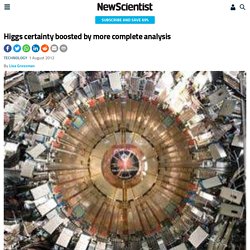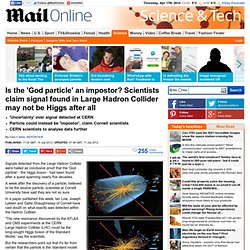

Higgs certainty boosted by more complete analysis - physics-math - 01 August 2012. By Lisa Grossman Its discovery last month sparked a media storm but the Higgs boson is now even more of a sure thing.

ATLAS, one of the two experiments behind the original discovery, has carried out a more complete analysis that boosts the statistical significance of the Higgs signal even further. The analysis also shores up the classification of the particle as a Higgs boson – though whether this is exactly the Higgs boson predicted by the standard model of particle physics, or one with slightly different properties has yet to be nailed. On 4 July, the twin detectors at the Large Hadron Collider near Geneva, Switzerland – CMS and ATLAS – announced that they had finally found the long-sought Higgs boson, the last missing piece of the standard model and the particle credited with giving other particles mass. The Higgs wasn’t glimpsed directly: once it is created inside the detector it decays so quickly that it can only see the other particles the boson decays into. Strange Higgs.
Is the 'God particle' an impostor? Scientists claim signal found in Large Hadron Collider may not be Higgs after all. 'Uncertainty' over signal detected at CERNParticle could instead be 'impostor', claim Cornell scientistsCERN scientists to analyse data further By Daily Mail Reporter Published: 17:24 GMT, 10 July 2012 | Updated: 07:08 GMT, 11 July 2012 In a paper published this week, Ian Low, Joseph Lykken and Gabe Shaughnessy of Cornell have cast doubt on what exactly was detected within the Hadron Collider Signals detected from the Large Hadron Collider were hailed as conclusive proof that the 'God particle' - the Higgs boson - had been found after a quest spanning nearly five decades.

A week after the discovery of a particle, believed to be the elusive particle, scientists at Cornell University have said they are not so sure. In a paper published this week, Ian Low, Joseph Lykken and Gabe Shaughnessy of Cornell have cast doubt on what exactly was detected within the Hadron Collider. 'We show that current LHC data already strongly disfavor both the dilatonic and non-dilatonic singlet imposters. Is the Higgs boson an imposter?
High performance access to file storage A group of Argonne National Laboratory researchers has suggested that last week’s CERN data, fanfared to the world as the discovery of the elusive Higgs-Boson, might actually point to even more exotic creatures.

Their Arxiv-posted paper suggests that CERN’s data could have identified either “a generic Higgs doublet” or a “triplet imposter”. They do, however, borrow the Hitchhiker’s Guide’s “Don’t Panic”, noting that “a Standard Model Higgs boson gives a slightly better overall fit” with the current LHC data. The analysis, conducted by Ian Low, Joseph Lykken and Gabe Shaughnessy, focuses not on the mass resonance revealed in the LHC data (125 GeV), but on the electroweak quantum numbers of the discovered particle. Their paper speculates that this analysis gives rise to different interpretations of the same data. It’s only a few days since some writers were proclaiming the “end of physics”.